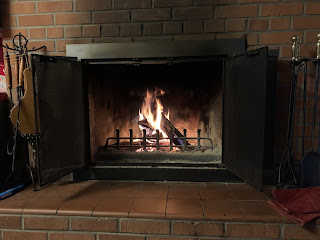According to a New Testament story, at the end of time all nations will be gathered together for the final separation. The righteous (the sheep) will be forever blessed.The unrighteous (the goats) will be forever cursed. This is the final "us and them" narrative. The good guys and the bad guys. In the story, the sheep are surprised to be found on the side of the good guys. "What did we do to deserve this?" they asked. The goats were surprised too. I guess we will all know in the great by and by. In the meantime we wait and wonder. Taking the story seriously, old puritans agonized whether they would be blessed or cursed. "Assurance of salvation" was for them a primary occupation. They agonized with questions of "faith and works." Do we make the cut based on what we have believed to be true, or on what we have done with our lives? The puritans erred on "salvation by faith," but did their best to live as if they would be among the sheep.
As I read the story today I was not drawn to ponder which group I would find myself in, but rather to the question of why humanity always divides into "us and them." Just about any marker of human life and culture has been used as a point of separation—tribes, villages, nations, genders, races, ethnicities, sports, religions, sub-sets of religions, political parties, computer preferences. (As an aside, of course Apple users are the blessed. I have know this truth for over thirty years.)
Chickens and eggs. Did the New Testament story arise out of humanity's seeming need to separate, and so give religious legitimation to the separation? Or have ancient stories repeated down the centuries contributed to and hardened the separation? Likely both.
But I'm still wrestling with the why. Greeks and barbarians. Catholics and Protestants. Conservative and Labour. Democrats and Republicans. Mods and rockers. English and Irish (or English and French or English and Germans, you choose). Why?
Perhaps the division of "us and them" is a projection of the divided self, our light and shadow sides, keenly felt inwardly and projected outward. We hate "them" because we hate ourselves. Perhaps we have a collective blindness to the complementarity of yin and yang, never "either or" but always "both and." Answers on a postcard please.
It need not be. In Christian mysticism the great goal is final unity with the divine when all shall be one. In Chinese philosophy all comes from wuji and will return to wuji. Jesus prayed, "that they may be one." Michael Puett and Christine Gross-Loh in their book The Path make a fine case for Confucian perspectives on daily life. They suggest that we live "as if" something were true, then in time we make the "as if" reality. We teach children manners—please and thank you—as if the children were grateful. In time, the repeated ritual of "please and thank you" are internalized and the child truly becomes grateful. Live "as if" you are kind by repeating kind actions and in time you become a kind person.
I'm thinking that if I live "as if" humanity is not divided into "us and them," then in time old habits of dividing will be overcome. Of course, I can't change the antagonism of the Greeks and barbarians. But I can effect change in my limited sphere. I can choose not to divide, not to think of others as among the "goats." I can live "as if" we are one.
I shall try "as if" today,
+Ab. Andy
